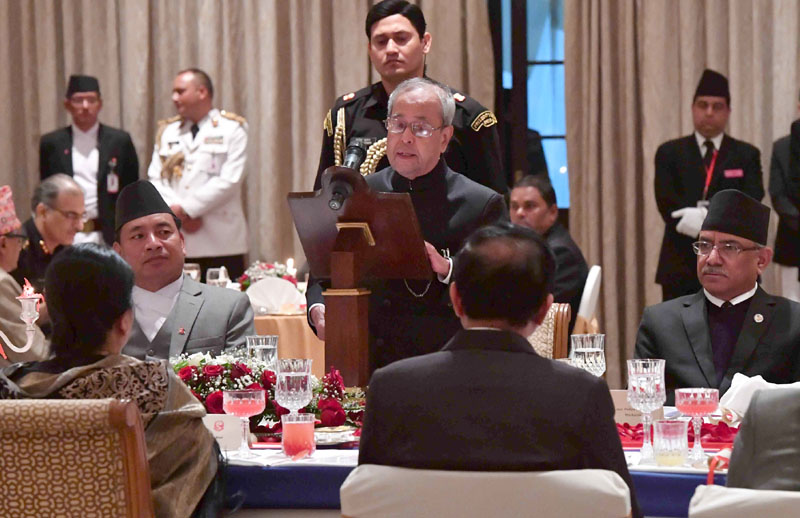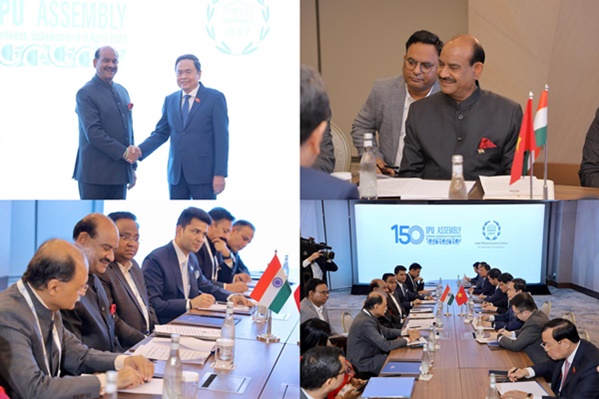Nepal can benefit from India's economic transformation: Pranab Mukherjee
Thu 03 Nov 2016, 10:39:56

President Pranab Mukherjee has said that rapid economic transformation that is taking place in India presents unprecedented opportunities for the people of Nepal. Addressing a gathering of state dignitaries at a banquet, hosted by Nepal's President Bidhya Devi Bhandari yesterday, Mr. Mukherjee invited them to be stakeholders in India’s growth story. The President is on a three visit to Nepal.
President Pranab Mukherjee emphasized that together both the countries can achieve the full potential of the increasing mutually beneficial cooperation in varied areas such as trade, investment, agriculture, hydro-power, infrastructure development and connectivity projects. He said that India is proud of the achievements of the people of Nepal and in the success of the development partnership with Nepal.
Mr. Mukherjee stressed that the canvass of India’s bilateral cooperation involves dimensions of human endeavours too. He said that India and Nepal has age-old historical relations. Mr. Mukherjee said that the socio-economic, cultural and people to people relation between the two countries provide vitality and dynamism to unique, time-tested and multi-facted relations.
Yesterday, Nepal’s Vice President Nanda Bahadur Pun and Prime Minister Puspa Kamal
Dahal, also known as ‘Prachanda’ called on Mr. Mukherjee. The Indian President also visited ‘India House’ for a welcome reception organised by Indian Ambassador to Nepal in his honour.Modi to inaugurate Asian Ministerial Conference for Disaster Risk Reduction today
Dahal, also known as ‘Prachanda’ called on Mr. Mukherjee. The Indian President also visited ‘India House’ for a welcome reception organised by Indian Ambassador to Nepal in his honour.Modi to inaugurate Asian Ministerial Conference for Disaster Risk Reduction today
Prime Minister Narendra Modi will inaugurate three-day Asian Ministerial Conference on Disaster Risk Reduction, AMCDRR, in New Delhi today. Addressing a press conference in New Delhi, Home Minister Rajnath Singh said, 61 counties have confirmed their participation. He said, the aim of the conference is to find ways for better management of disaster risk.
Mr Singh said, the AMCDRR will provide a unique opportunity to shape the implementation and monitoring of the Sendai Framework in Asia. The conference will come out with a declaration consolidating the political commitment of governments towards preventing and reducing risk as well as strengthening resilience by accelerating implementation.
Many countries in Asia-Pacific have made considerable progress in disaster preparedness and in reducing vulnerabilities resulting in reduced mortality associated with hydro-meteorological hazards. However, economic losses in the region due to disasters continue to increase.
No Comments For This Post, Be first to write a Comment.
Most viewed from Specials
Most viewed from World
AIMIM News
Latest Urdu News
Most Viewed
May 26, 2020
Do you think Canada-India relations will improve under New PM Mark Carney?
Latest Videos View All
Like Us
Home
About Us
Advertise With Us
All Polls
Epaper Archives
Privacy Policy
Contact Us
Download Etemaad App
© 2025 Etemaad Daily News, All Rights Reserved.






















.jpg)
.jpg)
.jpg)

















